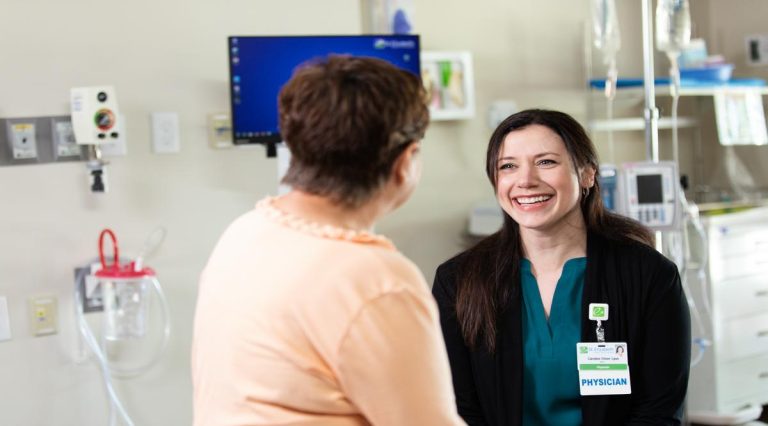Staying on top of your health means making time for an annual gynecologist visit. Abby Loftus-Smith, MD, an Obstetrician-Gynecologist practicing at St. Elizabeth, says, “It’s not just about Pap smears — it’s a full spectrum of care.”
Many women wonder if a yearly appointment is necessary if they’re healthy. And guidelines for certain screenings, like Pap smears and mammograms, may seem unclear. “A gynecologist can walk you through the pros and cons of screenings. We help you make decisions based on your family history or risk factors. It’s about catching things early when treatment is most effective,” clarifies Dr. Loftus-Smith.
What to Expect During a Well-Woman Exam
“There are a number of things that happen in a well-woman exam,” says Dr. Loftus-Smith. “It’s not just about getting your Pap smear — it’s about making sure your gynecologic health screenings, medications and vaccinations are up to date.”
These visits are comparable to an annual physical with your Primary Care provider.
For many women, these visits fill gaps that general practitioners may not address. “Some primary care doctors have a passion for women’s health. They may cover these areas but prefer that their patients see a provider who specializes in women’s health,” says Dr. Loftus-Smith.
Understanding Screening Guidelines and When You Should Start
When it comes to screenings, such as mammograms, guidelines can vary. “Some organizations recommend starting at age 50, while others say age 40,” says Caroline Elmer-Lyon, MD, a Urogynecologist practicing at St. Elizabeth. “Having a gynecologist to talk through the pros and cons and look at your family history can help you decide if you need to start earlier.”
Gynecologists and urogynecologists are trained to look for early warning signs. They aren’t afraid to dive into the details. “We want to do an exam every year because early detection is key,” Dr. Elmer-Lyon adds. “We can screen for human papillomavrius (HPV) to detect and diagnose any abnormalities in the female reproductive system. We examine the tissue that lines the uterus to determine if pain and abnormal bleeding are due to endometriosis.”
Judgment-Free Gynecology Care
Annual gynecologist visits provide a safe space to address personal and sensitive topics. “People don’t want to talk about vaginal health or sex — it can make them uncomfortable. But these are integral parts of a woman’s well-being,” says Dr. Loftus-Smith.
Dr. Loftus-Smith explains that gynecologists are well-versed in asking the tough questions: “Do you have pain during sex? Are there issues with your vaginal health? We ask about these things because we know many women feel uncomfortable bringing them up on their own.”
“The number of times I hear patients say, ‘I didn’t know this wasn’t normal,’ shows the importance of having these conversations with a trusted expert,” she adds.
How Gynecologists Help with Complex Health Decisions
Gynecologists and urogynecologists don’t just handle routine exams — they guide women through complex and personal health decisions. Whether it’s determining when to start mammograms, managing menopause symptoms, addressing urinary health concerns or discussing pelvic pain, having a trusted expert makes a world of difference.
“Women’s health is multifaceted. Having a specialist to rely on can make navigating life stages less overwhelming. An open dialogue is the key to finding solutions and improving quality of life.”
Remember, annual gynecologist visits aren’t just check-ups — they’re a proactive way to prioritize your overall wellness. Don’t wait until something feels wrong to schedule your appointment. Instead, make it a regular part of your healthcare routine.
Take the first step toward better health today. Your well-being is our priority. To schedule an appointment at one of our OB-GYN offices, please login to your MyChart account. To find a gynecologist or urogynecologist, search our provider listings.

